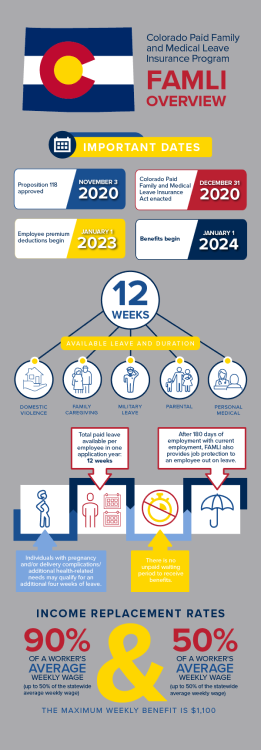The Family Medical Leave Act (FMLA), enacted on August 5, 1993, provides twelve weeks of covered leave within a 12-month period for eligible employees. Despite providing job protection and continuation of group health insurance, if applicable, being approved for FMLA does not provide income replacement to employees on leave. Overseen by the United States Department of Labor, FMLA represents the minimum standards employers must comply with regarding covered leave.
Several states have enacted paid family and medical leave laws to help close the gaps resulting from unpaid leave. While significant progress has been made, state-level leave only exists in some states. Nine states and the District of Columbia have enacted paid family and/or medical leave. An additional seven states have approved legislation with an expected future start date. One such state is Colorado, which recently enacted a Paid Family and Medical Leave Insurance program.
Colorado Paid Family and Medical Leave Insurance Program (FAMLI)
On November 3, 2020, Colorado voters approved Proposition 118, paving the way for Colorado to implement state Paid Family and Medical Leave. Just over a month later, on December 31, 2020, the Colorado Paid Family and Medical Leave Insurance program (FAMLI) was enacted, providing Colorado workers access to grow their families or care for themselves or family members as they contend with serious health conditions, all the while receiving income replacement and not worrying about losing their job
On January 1, 2023, an initiative to fund the program through employer and employee contributions was launched. For the first two years, the cost for each worker will be capped at 0.9% of their weekly wage, expected to be split between the employee and the employer. Employers may fund the entire premium for their employees but are not required to do so. The cap is expected to rise steadily but not exceed a total of 1.2% of a worker’s weekly wage. Under the current cap, a worker who makes a $55,500 annual salary can expect to pay $249.60 per year, with their employer paying a matching amount.
Beginning January 1, 2024, employees will be able to take up to twelve weeks of leave to:
-
- Care for a new child, including adopted and fostered children;
- Care for themselves, if they have a serious health condition;
- Care for a family member’s serious health condition;
- Make arrangements for a family member’s military deployment; or,
- Address the immediate safety needs and impact of domestic violence and/or sexual assault.
Additionally, individuals with pregnancy and/or delivery complications/additional health-related needs may qualify for an additional four weeks of leave.
Under FAMLI, there is no unpaid waiting period to receive benefits, so workers will be compensated from the date of approval. After 180 days of employment with current employment, FAMLI will also provide job protection to an employee out on leave.
Additional support for Colorado workers
When it comes to attending to a personal or family matter, not every worker will qualify for nor require the use of benefits available through the FAMLI Act. In these instances, workers can utilize benefits available to them through the Healthy Families and Workplaces Act (HFWA). On June 2, 2023, Governor Jared Polis signed a bill into law extending the use of the HFWA. The HFWA previously permitted employees to use up to 48 hours of paid sick leave per calendar year for reasons related to their health or to care for the health of a family member; to obtain services related to being a victim of domestic abuse, sexual assault, or harassment; or if their place of business or child’s school or place of care closed due to a public health emergency. As of August 7, 2023, coverage has been extended, and employees will have the option to use their paid sick time for additional reasons, such as:
-
- Grieving, attending funeral services or a memorial, or dealing with financial and/or legal matters arising after the death of a family member;
- Caring for a family member whose school or place of care has been closed due to inclement weather, loss of power, heating, or water, or another unexpected occurrence or event that results in the closure of the family member’s school or place of care;
- Evacuating their residence due to inclement weather, loss of power, heating, or water, or another unexpected occurrence or event that results in the closure of the family member’s school or place of care.
The future of paid state leave
As has been the case for the past several years, we expect more changes in the covered leave landscape over the next few years as additional states continue discussing implementing their own plans.
Covered leave is one of the many parts of the absence process that is constantly changing. It is important to remain aware that specific requirements, especially at the state-specific level, are subject to change. At Brown & Brown Absence Services Group, we continue to monitor covered leave and the evolving landscape. If you are interested in learning more about how we can partner to support your organization, contact us today.





